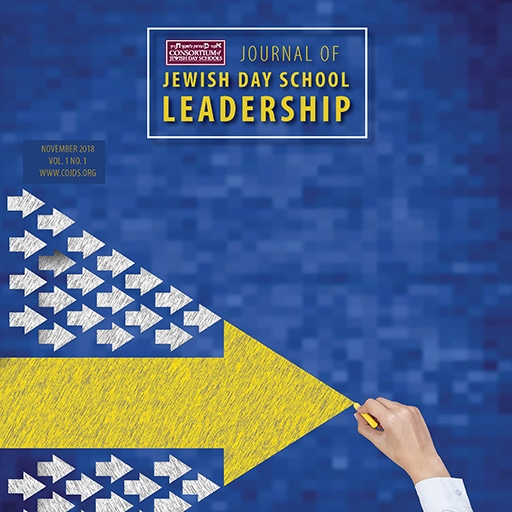
Seeking Submissions
January 3, 2022
CoJDS’ Curriculum Development–A Closer Look
January 17, 2022Rabbi Dovid Engel addressed mechanchim last spring as part of the Lilmod U’lilamed Chinuch Training Program. This article is adapted from that message.
1. Resilience
If we learned anything from the experience of chinuch during the covid pandemic, it was that to be an effective mechanech, one needs resilience. As we learn Tanach, the example set by our avos teaches us all of the middos we need. Where do we find the midda of resilience mentioned in Tanach?
לַמְנַצֵּ֬חַ ׀ עַֽל־שׁוֹשַׁנִּ֬ים לְדָוִֽד׃ הוֹשִׁיעֵ֥נִי אֱלֹהִ֑ים כִּ֤י בָ֖אוּ מַ֣יִם עַד־נָֽפֶשׁ׃ טָבַ֤עְתִּי ׀ בִּיוֵ֣ן מְ֭צוּלָה וְאֵ֣ין מׇעֳמָ֑ד בָּ֥אתִי בְמַעֲמַקֵּי־מַ֝֗יִם וְשִׁבֹּ֥לֶת שְׁטָפָֽתְנִי׃ יָגַ֣עְתִּי בְקׇרְאִי֮ נִחַ֢ר גְּר֫וֹנִ֥י כָּל֥וּ עֵינַ֑י מְ֝יַחֵ֗ל לֵאלֹהָֽי׃ רַבּ֤וּ ׀ מִשַּׂעֲר֣וֹת רֹאשִׁי֮ שֹׂנְאַ֢י חִ֫נָּ֥ם עָצְמ֣וּ מַ֭צְמִיתַי אֹיְבַ֣י שֶׁ֑קֶר אֲשֶׁ֥ר לֹֽא־גָ֝זַ֗לְתִּי אָ֣ז אָשִֽׁיב׃ אֱֽלֹהִ֗ים אַתָּ֣ה יָ֭דַעְתָּ לְאִוַּלְתִּ֑י וְ֝אַשְׁמוֹתַ֗י מִמְּךָ֥ לֹֽא־נִכְחָֽדוּ׃ אַל־יֵ֘בֹ֤שׁוּ בִ֨י ׀ קֹוֶיךָ֮ אֲדֹנָ֥י יֱהֹוִ֗ה צְבָ֫א֥וֹת אַל־יִכָּ֣לְמֽוּ בִ֣י מְבַקְשֶׁ֑יךָ אֱ֝לֹהֵ֗י יִשְׂרָאֵֽל׃ כִּֽי־עָ֭לֶיךָ נָשָׂ֣אתִי חֶרְפָּ֑ה כִּסְּתָ֖ה כְלִמָּ֣ה פָנָֽי׃ מ֭וּזָר הָיִ֣יתִי לְאֶחָ֑י וְ֝נׇכְרִ֗י לִבְנֵ֥י אִמִּֽי׃ כִּֽי־קִנְאַ֣ת בֵּיתְךָ֣ אֲכָלָ֑תְנִי וְחֶרְפּ֥וֹת ח֝וֹרְפֶ֗יךָ נָפְל֥וּ עָלָֽי׃ וָאֶבְכֶּ֣ה בַצּ֣וֹם נַפְשִׁ֑י וַתְּהִ֖י לַחֲרָפ֣וֹת לִֽי׃ וָאֶתְּנָ֣ה לְבוּשִׁ֣י שָׂ֑ק וָאֱהִ֖י לָהֶ֣ם לְמָשָֽׁל׃ יָשִׂ֣יחוּ בִ֭י יֹ֣שְׁבֵי שָׁ֑עַר וּ֝נְגִינ֗וֹת שׁוֹתֵ֥י שֵׁכָֽר׃ וַאֲנִ֤י תְפִלָּֽתִי־לְךָ֨ ׀ יְהֹוָ֡ה עֵ֤ת רָצ֗וֹן אֱלֹהִ֥ים בְּרׇב־חַסְדֶּ֑ךָ עֲ֝נֵ֗נִי בֶּאֱמֶ֥ת יִשְׁעֶֽךָ׃ (תהילים סט)
תהילים סט is filled with Dovid describing the terrible situation he found himself in and his calling to Hashem for help. What’s the story behind this perek of tehillim? What did Dovid mean when he referred to his shame, and to the “yoshvei shaar” speaking about him?
The ספר התודעה (section on סיון called רות ודוד) explains the background. The well-known incident in Shmuel 1:17 describes the navi Shmuel going to Yishai’s house to anoint one of his sons as the king. One by one they are rejected, and Shmuel asks for Dovid – who wasn’t home. Shmuel says to bring Dovid. It’s curious that Yishai, a tzadik who never did an aveira his whole life, would leave Dovid out.
There’s a gemara in Bava Basra 91 that offers some more information about Dovid’s background, his position in the family, and why he wasn’t around when Shmuel came to anoint him. The gemara says that the name of Dovid’s mother was Nitzeves bas Adal. Yishai, his father, had decided late in his life that perhaps the drasha of “moavi v’lo moaviah” is wrong, and since he was descended from Rus, he worried that he was pasul – ineligible to marry a Jewish woman. At that point, he separated from his wife Nitzeves for several years.
Yishai wanted to be able to have more children, but he couldn’t marry a Jew. Instead, he freed a female slave with a tnai and intended to have a baby with her: if I’m kosher, he would be freeing the female slave and the child will be a regular Jew; but, if I’m pasul, I will marry her still as a slave, and her child will be an eved, son of a shifcha, (and he can convert to become a Jew). When the female slave learned of his plan, she decided together with her mistress Nitzeves to swap places, like Rachel and Leah did.
A while later, Yishai noticed that Nitzeves was pregnant and since she was still married to him but was separated from him, Yishai assumed that she had been involved in adultery. Yishai didn’t realize that he was the father, so he announced to everyone that the baby born to Nitzeves will be “disgusting and a slave” (a mamzer). Dovid was born, and he grew up like this, assumed to be a mamzer. Nitzeves, of course, knew that he was the son of Yishai and not at all a mamzer, and while she never told him directly, she would rock him to sleep saying, “tahor ata” – you have kosher lineage. Throughout his childhood she taught him resilience, and though he was constantly ridiculed and ostracized as a mamzer, he was able to stand up to the ridicule.
Finally, when Shmuel anointed Dovid to be the king, everyone saw the truth – that Dovid was the son of Yishai (and the descendants of Rus the Moaviah were kosher.) It was at this point that they said the pesukim from Tehillim that we say in Hallel –אבן מאסו הבונים היתה לראש פינה, etc. Dovid went on to have a hard life, pursued by King Shaul, two sons who rebelled against him, and other difficulties, but he carried through. Dovid teaches us the importance of resilience. Though I’ve been in chinuch for years and it’s the best profession you can choose, you do need to be resilient, and I hope that this example of Dovid helps when it gets dark.
2. Stepping Up During your Defining Moments
The second thing I wanted to mention for those in chinuch is the idea of stepping up during your defining moments. We learn this from Pinchas. He was basically a no man’s land – not a Levi or kohen. His grandfather, father, and uncles were all kohanim, but he wasn’t. However, he was one of Moshe’s main talmidim. When Moshe came down from Har Sinai he taught Pinchas the halacha of הבועל ארמית קנאים פוגעים בו. Then we come to the incident with Zimri, who was Shaul ben Hacanaanes, the son of Dina and Shimon. He was over 200 years old and a very respected leader. For some reason he did this terrible sin, and Pinchas looked around and saw that the gedolim were crying and didn’t know what to do. Pinchas remembered what Moshe taught him, and he stood up and killed Zimri, stopping the mageifa. Everyone has defining moments in their life. We should learn from Pinchas to be prepared to step up when these moments arise.
3. Know your Talmid
How well do you know your talmid? It’s very important to know as much as you can before the year starts. I know a very sad story of rebbi who didn’t know his talmid was a yasom. He used to tell the talmid to study for tests with his father, reminded him to have his father sign them when he didn’t do well… and then the rebbi found out at parent-teacher conferences that the boy’s father had passed away the year before. He ran to the menahel and said, “How could you not tell me?” But I say to the rebbi – “How could you be his rebbi for three months and not know he’s a yasom?”
Rabbi Yoel Kramer developed the 4 H’s about how well you should know your talmidim. They are home, happenings, horim, hashkafa. (See sidebar below.) He recommends visiting the family before the year starts, if possible, to see how the talmid lives.
Schools are a place where the primary goal has to be simchas hachayim. Rabbi Noach Orloweck said that lots of schools pride themselves on academic excellence to the detriment of their students’ happiness. Academics are very important, but if you have a happy child, he is a klei kibul to learn, so happiness is the starting point upon which to build the academics.
It’s very important to develop a kesher with the talmid. Many rebbeim rose to the challenge of developing and maintaining this kesher during covid, visiting, calling, or sending small gifts, and they found that these gestures went a long way. You will often find that if you have a child who’s difficult in class, the solution is to give him a little bit of attention out of class. Call him in the evening a few times, and after a few weeks he won’t dare to misbehave in your presence. (This is much more natural and easier to do if you visited before the year started! Also, let the parents know that you will be calling so they are expecting it.) Some rebbeim may worry about losing respect by becoming too friendly with talmidim. I recommend that you tell your talmidim, “You’re my friend – but I’m not your friend.” These phone calls are an excellent way of establishing this kind of “friendship”.
4. Helping your Talmidim Develop “Learning Skills”
You give a man a fish and you feed him for a day; you teach him to fish, and you feed him for life. The learning skills we help our talmidim develop are invaluable. When you make a talmid proficient in learning, he starts to believe in his own ability to learn. He feels successful and then he’ll like doing it, because we all like doing what we’re good it.
One example is using the gemaras that have nekudos in them. In our cheder, we give boys two gemaras (one with nekudos and one without) for the first few years until they’re proficient in reading gemara. Some say it’s not the mesora to use nekudos in gemara, but if you look in old gemaras, they had nekudos (for example, a gemara I saw printed in 1906 with a haskama from R’ Chaim Ozer.) If a talmid doesn’t have the opportunity to develop reading proficiency, he always struggles with reading.
Rabbi Hillel Mandel developed something called דר”ש אמ”ת – the 6 tools to teach a child that empowers him to learn on his own. With these six tools, anyone can develop the skill to understand chumash on their own.
- דקדוק – use basic understanding of grammar to understand what the pasuk says
- רש”י – use rashi to understand the pshat
- שרש – find the shoresh to help you correctly translate the words
- אונקלוס – consult the Targum Unkelos to help understand the pasuk
- טעמי המקרא(trop) – use the taamei hamikra to properly phrase and understand the pasuk
- תוכן (context) – finally, use the context to understand
The important thing to keep in mind is that our job is not to be spoon-feeders but to help talmidim develop skills. When a child learns on his own, he feels so much better about it.
5. Ideas
I’ll close with some short ideas that I think will help you be successful:
• I love the idea of presenting a shiur for fathers, perhaps twice a month, so that they know what you’re learning in class and can learn with their children.
• A great way of focusing on each talmid and developing a kesher is by making an “I Care About You” book. You can use a binder or notebook and dedicate three pages per talmid. Each day, focus on one talmid and take notes about them. You will find that you build up a real knowledge of the talmidim, helping the kesher, and as a bonus, you’ll have specific examples to relate to parents when you speak to them.
• It’s a great idea to call parents and grandparents as much as you can. In fact, I call the parents (and in-laws) of my rebbeim often. One of my rebbeim told me that after I called his mother-in-law, he was treated like a real king when he visited for Yom Tov. These calls can be invaluable.
• Finally, I recommend that you read the book “Spare the Child” from cover to cover. It has a beautiful definition of what chinuch is. Based on the Mesilas Yesharim, a person is created to get pleasure from Hashem. It’s our job to help children find enjoyment in ruchniyus.
SUMMARY OF THE 4 H’S:
1. Home
· What neighborhood does the talmid live in?
· What is the size of his family’s home?
· Does he have siblings? How many?
· Birth order
· Is there seder in the house? Does the household run functionally, with meals on time, etc.?
· Does the talmid have responsibilities at home or are the children in his family “entitled”?
2. Happenings
· Did the talmid move recently?
· Is there construction going on at home?
· Is the family making a simcha?
· Is someone going away to yeshiva, seminary, etc.?
· Might there be illness in the family?
· Has there been a death in the family?
3. Horim (Parents)
· What is the ethnicity and background of the parents?
· What language do they speak at home?
· What education did the parents have?
· What are the parents’ occupations? What titles do they use?
· Is there a stay-at-home mom?
· How old are the parents?
· Do the parents have shalom bayis?
· Is it a happy, warm house?
· What parenting style do the parents use? For example, are they drill sergeant parents (our way or the highway,) helicopter parents (always hovering and involved), etc.?
4. Hashkafa or Values
· Would you describe the family as conformist or not?
· Does the family have respect for authority?
· What is the family’s discipline style?
· Are they machshiv Torah?
· What is their perspective about future professional careers for their children?
· Which shul do they belong to?
Rabbi Dovid Engel has served as Head of School at the Toronto Cheder since 2007. He began his teaching career at the Yeshiva Gedolah of Montreal as a rebbe teaching middle school in 1987 and became menahel of the Yeshiva in 2000. Rabbi Engel welcomes feedback and is available to assist rebbeim and moros at any level. He can be reached at 647-832-4825 and [email protected].

